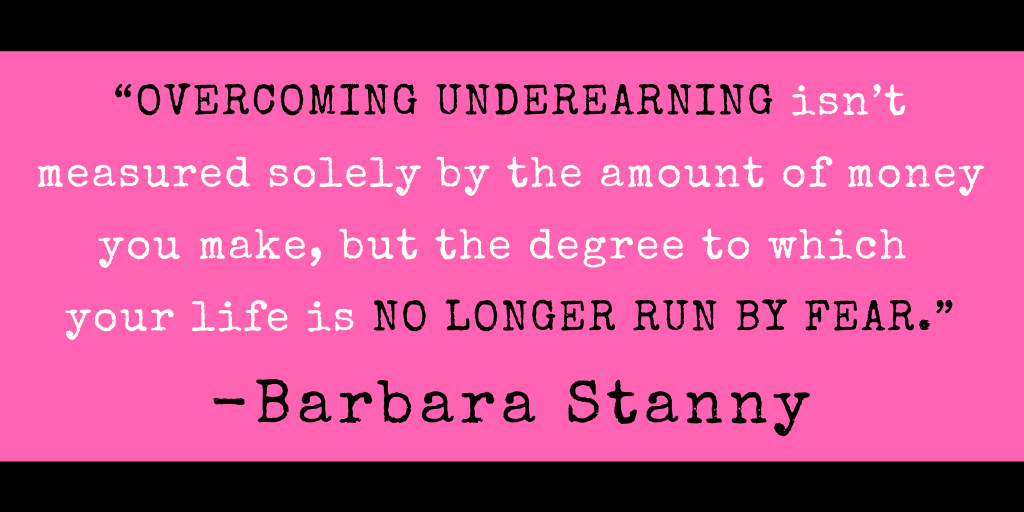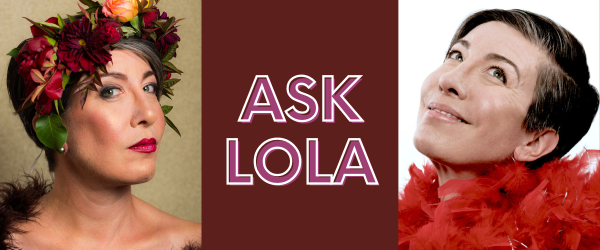Anyone who says camming is easy money has no idea what they’re talking about — it’s hard work! The hours can be long, and the competition is fierce. We can be tempted to lower our rates or bend over backwards to keep fans happy. Of course, just like any other job, there are times when we have to do things we’re not thrilled about. But when we suffer from a chronic lack of confidence, we risk selling ourselves short.
For all independent sex workers, I highly recommend the book Overcoming Underearning: A Five-Step Plan to a Richer Life by Barbara Stanny. Aimed squarely at the self-employed, her book examines why we undervalue ourselves. Stanny defines an underearner as:
Someone who earns less than their potential, despite their need or desire to do otherwise…. Underearning is a condition of deprivation in which your emotional and/or physical needs are not being met. It never leads to a saner or more satisfying life. It always involves self-denial—not only of money, but time, freedom, impact, and joy; denial of your value, your power, your needs, and your options.
Stanny’s core insight is that we keep ourselves small because it feels safe and familiar, even as we struggle, even as we crave more. We might undervalue our worth because:
- We’re focused on our limitations.
- We were raised to always be pleasing and pliant.
- We never learned how to negotiate.
- We fear asking for more because it makes us seem graspy or harsh.
- We simply can’t believe there are enough resources in the world for “people like us.”
The irony is fear can cause us to act against our own best interests, guaranteeing our dissatisfaction. How can living in terror of conflict ever get us what we want? Spoiler alert: It can’t. In contrast, it is far better to say yes when we mean yes, and say no when we mean no, stating our needs plainly and accepting the consequences. This is a much more effective way to live.
Now, don’t get me wrong — asking for more is challenging. Asserting ourselves means living with uncertainty. Fans may go elsewhere, talking shit as they head out the door. If we allow fans to define us, however, they surely will, and not to our benefit. If we refuse to give them that power, then whatever they say or do is just noise. As Stanny says, “Overcoming underearning isn’t measured solely by the amount of money you make, but the degree to which your life is no longer run by fear.”
Stanny points out the positive changes that stem from deciding we deserve better, regardless of any negative voices in our heads, the pain of the past, or hateful messages from society. She writes:
When you begin valuing yourself, your finances inevitably improve, along with most everything else. Conversely, low self-esteem makes it difficult, if not impossible, to reach the next level. Why? Because you don’t believe you can. And there’s no better way to reinforce that belief, limit your power, diminish your value, than by lowering your earning potential. It all works together.
Stepping into our worth isn’t magic, but it’s a process that takes time, with good days and bad. Overcoming underearning means:
- Firing time-wasters in order to be available for supportive fans.
- Not giving things of value away for free, including our time.
- Cutting off haggling.
- Silencing the inner voice that says there’s never enough.
- Stepping away from people who don’t grow, change, learn, reciprocate, and express gratitude.
Even when life isn’t perfect, even when our situation isn’t everything we want it to be, we don’t settle for less. Instead, we strive for more. We replace self-defeating behaviors with positive, assertive choices by:
- Saying what we mean, meaning what we say, and asking for what we want.
- Taking responsibility for our needs, desires, and obligations.
- Setting clear limits on our time.
- Noticing not just what people say, but what they do. If they aren’t in alignment, we move on.
- Avoiding anyone who manipulates with anger, helplessness, passive aggression, or dishonesty.
- Believing our gut without self-doubt or regrets.
Most of all, we trust that there are plenty of kind, generous fans who respect our limits and are happy to pay for what we uniquely offer.
I offer practical steps for assertiveness strategies here, and in my latest book, Thriving in Sex Work: Sex Work and Money, a personal finance guide for sex workers, which is available now. For a more in-depth discussion on assertiveness tools, 13 Things Mentally Strong People Don’t Do by Amy Morin is another great resource.
Somebody once said, “If you don’t believe in yourself, no one else will.” That goes double for our earning power. Earning what we deserve begins with us.
Until next time, be sweet to yourself.
Lola D.

—
Lola Davina is a longtime veteran of the sex industry and author of Thriving in Sex Work: Sex Work and Money, her followup to the formative Thriving in Sex Work: Heartfelt Advice for Staying Sane in the Sex Industry. Contact Davina at Lola.Davina@ynotcam.com and visit her on Twitter at @Lola_Davina.
Image of Lola Davina courtesy Pat Mazzera.









